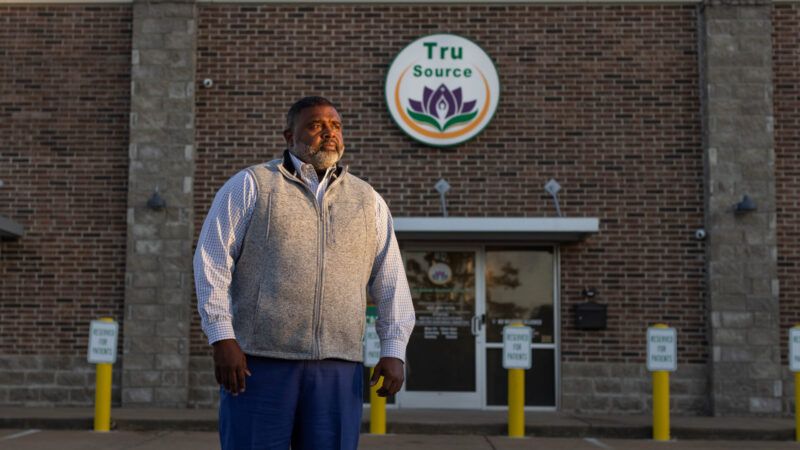Mississippi Says Medical Marijuana Is Legal—Just Don't Talk About It
The state legalized medical marijuana but banned dispensary owners from advertising. Now, one owner is taking the fight to the Supreme Court.

Small-business owner Clarence Cocroft budgeted for advertising when he launched his company in DeSoto County, Mississippi. He even purchased billboards. But when the time came to announce his presence, state regulators silenced him.
Cocroft is prohibited from talking about his business on the radio or television or advertising in newspapers, the internet, or outdoors. He is only permitted to hang a sign on his property and have a website with basic information. The state is targeting Cocroft—who obtained all the proper business permits during a tedious startup process—because his industry is medical marijuana.
Mississippi lawmakers legalized medical marijuana in 2022. But at the same time, they empowered the state Department of Health to control advertising.
The extent of the ban was not immediately clear. The rules took shape as Cocroft worked to launch Tru Source Medical Cannabis, Mississippi's first black-owned medical marijuana dispensary. By the time he opened his doors, the speech police were ready to pounce.
"I own this billboard," Cocroft said during a 2023 interview, pointing to one of his highway signs. "But I cannot advertise because it is a medical marijuana business."
Normally, when pot dispensaries face discrimination, the tension is due to an ongoing power struggle between federal and state governments. This began in 1996, when California set its own pot policy in defiance of the federal Controlled Substances Act, and since then, 40 states have followed with marijuana laws of their own. The issue in Mississippi is different. Nobody in Washington, D.C., is meddling and federal agencies do not enforce against state-legal medical marijuana businesses.
Mississippi is engineering its conflict entirely from within, claiming that medical marijuana is legal to sell but not advertise. This gamesmanship leaves Cocroft in limbo. He can run his business legally, but he cannot talk about it.
"When you can't advertise, it's a disaster," Cocroft said. "They're setting you up for failure."
Besides defying logic, the censorship is unconstitutional. The Supreme Court held in Central Hudson Gas & Electric Corporation v. Public Service Commission of New York that the First Amendment protects truthful advertising about legal products.
Mississippi wants to argue that medical marijuana is legal under state law, while clinging to federal rules that make the product illegal. In other words, Mississippi wants to have its pot brownie and eat it, too.
Cocroft challenged the absurdity in a First Amendment lawsuit in 2023, represented by our public interest law firm, the Institute for Justice. Despite Supreme Court precedent, the 5th U.S. Circuit Court of Appeals ruled against Cocroft in November 2024.
Because marijuana is federally illegal, a three-judge panel held, "the state faces no constitutional obstacle to restricting commercial speech relating to unlawful transactions."
Mississippi can defy Congress when it wants, and then turn around and hide behind Congress to silence people like Cocroft, singling them out for restrictions that other small-business owners do not face.
"You will see billboards from casinos to gentlemen's clubs to whatever," Cocroft said. "This is the only industry they will not allow advertising."
If the ruling stands, the discrimination will continue. But Cocroft is not done fighting. On March 21, 2025, he petitioned the Supreme Court to hear his case. His ultimate goal is to help patients who cannot find his shop if they do not know it exists.
"Chemo patients, patients suffering from depression, patients that are suffering from [post-traumatic stress disorder], a lot of veterans, and patients with neurological or neuropathy pain," Cocroft said. "They have a story, and it hits home."
Other states could also use clarity from a Supreme Court decision.
As things stand, pot dispensaries cannot advertise on highway billboards in California. They cannot have online pop-up ads in Colorado, show images of cannabis plants in Connecticut, or pass out fliers in Maine. Minnesota even requires dispensaries to submit advertisements to the government for pre-approval.
All Cocroft wants to do is speak truthfully about his legal business. Mississippi ought to let him.


Show Comments (5)